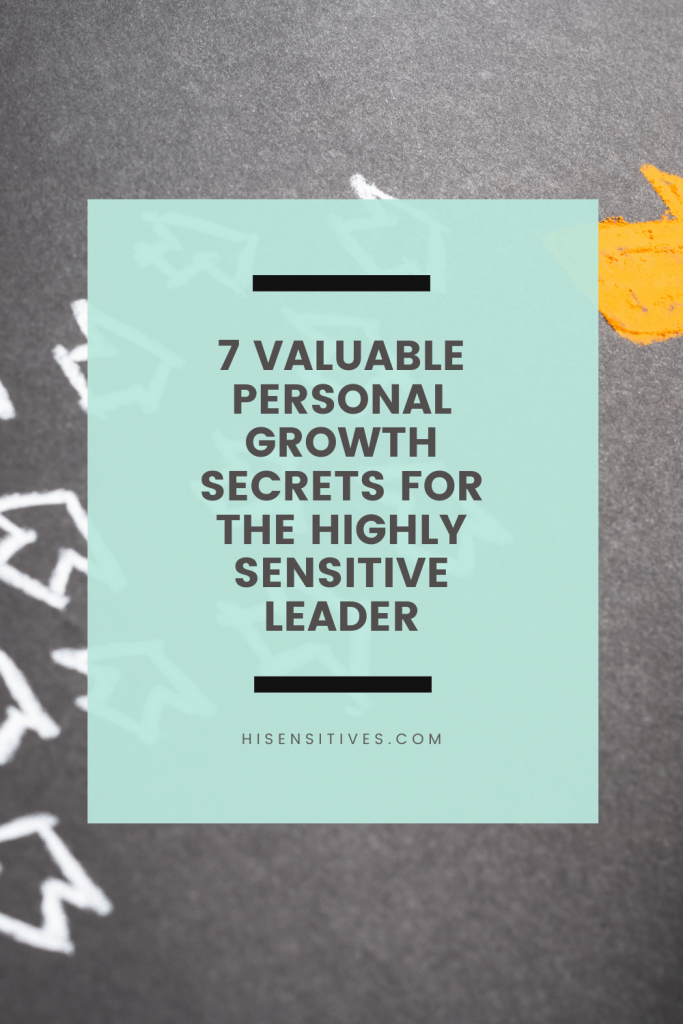Are you planning on taking a leadership role? In this article, you’ll discover 7 valuable secrets to improve your leadership skills and work on your personal growth as a leader.
Estimated reading time: 7 minutes
As a young girl, I always dreamed of working independently and running my own business someday. Back then, I wanted to own my own ice cream truck. While my ice cream business never became reality, I still managed to make my dream come true to run my own business.
I love what I do for HiSensitives and preferably work on my business daily. Nevertheless, I recently came to the realization, that I want and need to collaborate with others. This would help me to achieve more with my business. However, that would mean that I’d have to become a leader.
That thought was frightening to me. While I have been leading group projects at school in the past, I never would have dreamed of becoming a leader within my own business one day.
There are many responsibilities that come along with leading. Also, it brings along new challenges that you don’t have to face when working on your own.
Therefore, I took a deep dive into the world of leadership. In this article, I’ll share seven valuable personal growth insights to accelerate as a highly sensitive leader.
#1 Understand Your Leadership Style As A Highly Sensitive Person
The first personal growth secret when it comes to being a successful highly sensitive leader, is to understand your leadership style. Knowing your leadership style helps you to set up systems within your company or team. Also, it serves as a framework when dealing with challenging situations.
For instance, one person may have an authoritative leadership style, while another person may focus on teamwork and participatory leadership. Leadership style varies from person to person and also depends on the industry you’re working in.
If you choose to practice different leadership styles, your employees may be confused and not know what to expect from you. In addition, you may feel confused because you don’t take a specific position and switch style based on the different situations. By focusing on your main leadership style and utilizing it’s strengths, you provide a safe and clear work environment.
Therefore, make sure to understand what your main leadership style is. Then try to implement it in practice, without switching back and forth between different leadership styles.
If you’d like to read about the different leadership styles, you may want to have a look at the bestseller ‘The 9 Types of Leadership: Mastering the Art of People in the 21st Century Workplace’.
#2 Find Your Mentor For Advice
Once you choose to put yourself in a leadership role, it is wise to reach out to somebody who has experience with leadership. Oftentimes, it helps you to see things from their perspective. Moreover, this outside perspective helps you to see your blind spots as a leader.
Also during challenging times, having a mentor is a great privilege. Your mentor helps you to keep your head up during tough moments within your business. Additionally, they provide you with advice on how to handle your specific situation.
If you want more than one mentor, consider starting a mastermind group. This is a group of like minded professionals helping each other to grow their businesses by exchanging thoughts regularly.
In your mastermind group, you will definitely find the help you need with your most important personal growth questions as a leader.
#3 Do Your Shadow Work
It sounds very witchy, but in fact it is a very psychological activity: shadow work. Shadow work involves looking at your triggers from the past, your shortcomings and your biggest fears.
Becoming aware of what triggers your fears or your ego, is incredibly important when working with people. Sometimes, your employees may say things that are not necessarily meant in a harmful way, but you may feel triggered by it due to old wounds.
Therefore, make sure to become aware of these triggers within you, so you don’t loose it in front of your employees when they trigger you.
You can do shadow work by asking yourself questions such as:
- What experiences from my past have influenced my work ethic negatively?
- How do you perceive failure?
- What is your biggest fear as an entrepreneur?
- What are the worst character traits somebody else can have? Why do you feel that way? Where do these feelings stem from?
- When have you been self-sabotaging or destructive in your life?
If you’d like to take a deep dive into shadow work, definitely have a look at this shadow work journal and workbook for beginners.

#4 Set Goals Together With Your Employees
A big pitfall many leaders experience in their personal growth journey, is that they put their expectations on their employees. When the employee fails to live up to them, this results in disappointment within the leader.
To avoid this, you could try a more realistic approach: Instead of setting goals for your employees, set them with your employees. The employee can estimate what they can achieve within a specific amount of time. In addition, they are more likely to reach goals that they were actively involved in setting.
Remember to evaluate the goals with your employees every now and then. If you have a participatory leadership style – or other casual leadership style -, you may even evaluate your goals together. Leaders need proper goals too!
A wonderful way to set effective goals is explained in the book ‘How to Set Goals with Kaizen & Ikigai: Focus, Cure Procrastination, & Increase Personal Productivity.’
#5 Reflect Regularly
Another powerful personal growth secret for the highly sensitive leader is to reflect regularly. By looking at your past leadership situations and evaluating them carefully, you can learn a lot about yourself.
Describe specific situations that occurred, how you felt, how you handled it and what you could have done better. Also, reflect on how your leadership style was present or not present during that situation.
Reflection is something many successful leaders do. Therefore, put aside time for reflection moments in your calendar. It will benefit your leadership skills.
#6 Ask For Feedback
While reflection is a crucial personal growth activity for the highly sensitive leader, feedback is even more crucial. Oftentimes, our employees’ feedback enables us to see our blind spots.
Therefore, make sure to host regular feedback sessions, where you welcome your employees to provide you with feedback. This could be feedback about your way of communication, how things are going at the company and what you could improve in terms of work environment.
I know that this can be a tricky one for highly sensitive people, who often struggle with criticism. However, when you openly welcome the feedback, it does not feel as tough on you compared to when it is expressed uninvited.
Just make sure to see it as personal growth feedback, rather than criticism. This helps you to not feel bad about the points of improvement, but rather see them as opportunities for growth.
#7 Focus On Good Energy Management
As a highly sensitive leader, it is incredibly important to manage your energy properly. Especially when working together with other people, your energy has major impact on the performance of your employees.
Therefore, make sure to ground your energy before starting your work day. Also, try to meditate or do a calming activity halfway through your work day. This will help you to keep the energy high.
If you can, also enable your employees to do the same. Happy employees are crucial for a happy business. You could set up a personal growth challenge within your company, to stimulate your employees to focus on energy management.
Or perhaps you could host group meditations (if the employees are open-minded about that). The sky is the limit!
A Good Highly Sensitive Leader Is Continuously Focusing On Personal Growth
Now that you have read these 7 tips, it is time to start deep diving into your potential as a leader. By being aware of the importance of your own personal growth as a leader, you will inspire others to achieve their utmost potential too.
Have fun on your leadership journey!






